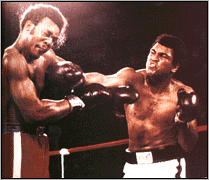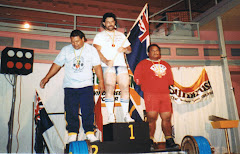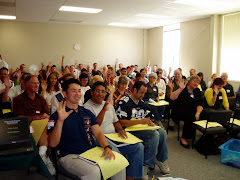This blog is a follow on from the one I wrote earlier titled "The Need for Obsession". I hope you continue to be challenged by what is in my opinion, the effort that is required of you if you want to be exceptional and master what you have chosen to do with your life.
Still Doubting?Is there any doubt that it is possible to achieve maximum results without giving maximum effort?
Is it possible to achieve all time greatness and do it by applying yourself in a mere average casual manner?
Surely it is true that a champion performance will require a champion build up and a long list of champion sacrifices. S

how me where it says that success comes easily. Show me someone who has attained their all time best performances on a global scale, and committed only partially to their own success. Where does hard work, dedication, sacrifice and long hours of applying oneself to the fulfillment of a life long dream NOT ask of you - your all? Asks of you your every fibre of being, every drop of blood stained sweat and demand fully of you, your precious time and your money.
For those who seek out the dizzying heights of Olympian success in business, sport or adventure. They know that they can not withhold a mere minute from being cast onto the fires that rage within them, to succeed at the elite level. It was Vince Lombardi that said, "...those who think winning isn't important, have never won anything." And what I say is "...those who think that you can lead a well balanced life and achieve maximum results. Results that define you as a person who is in the elite category of your chosen pursuit. And at the same time, be able to lead a well balanced life. Are clearly unaware, of what it takes to achieve maximum results at the highest level".
They Don't Wanna KnowThe average Joe on the street doesn't want to know that the gold medalist has lost his home, health, wife and children to represent his country. They don't want to know that the property investor has spent tireless hours studying, negotiating and searching for the best investment deals and has had to bounce back from many losses before she made tose millions as a real estate broker.
The average Joe wont accept the true cost of success. The deep need to be obsessive and excessive to achieve the exceptional results we hear about in the media. It's far too easy for them to attribute this level of success to God-given talent, excellent parenting and genetics or a stroke of good luck. Rather than consider these people have worked tirelessly and have understanding and supportive loved ones who were there, every step of the way, long before success ever came knocking at their door.
The majority of the public only want to know the success stories and believe it was an over night success sensation. Without any mention of the long tireless hours of practice, the sore muscles and early mornings followed by late nights with many setbacks they've experienced. They want to believe that it is possible to lead a balanced life and achieve at the highest level. This is as far from the truth, as the lie that the moon is made of cheese and geese lay golden eggs!
A Universal Law 
The universe has a law known as cause and effect. A broader description goes something like this and can not be avoided - your success in life will always "equal" the exact level of effort and time you commit to practicing and developing your talent. Read and re-read it till you get it, and get it good. There are no short cuts, there are no overnight successes and there is no free lunch!
I'm not talking about those who rise to the level of being above average, nor am I talking about those who have success on a local or regional scale. I am talking about those few who have left their mark on the profession they specialise in as an outlier for all to see, a benchmark of achievement that few, if any, will ever attain again.
The annuls of history hosts many of these excessive and obsessive elite men and woman spread across a broad spectrum of professions:
Ronald Trump, Barack Obama, Mother Theresa, Micheal Jordan, Michael Jackson, Howard Hughes, Tiger Woods Cassius Clay, Venus & Sarena Williams, Bob Charles, Michael Campbell, The Beatles, Bill Gates, Mozart, Beethoven, Sugar Ray Leonard, George Foreman, Sonny Liston, Lance Armstrong, Valerie Villi, Dame Susan Devoy, Michael Phelps, Buck Shelford, Colin Meads, Whitney Houston, Dame Kiri Te Kanawa, Sir Howard Morrision, Roz Savage, John Key, Helen Clark...
Does your name deserve to be their?
Many, many names are missing. One thing they all have in common is they each have applied themselves totally to their chosen path and achieved an equal measure of success relative to the effort and time they contributed. This will never change.
Show Me The Easy WayThere is no short cut. Give a little receive a little. Give a lot receive a lot. It's as simple as that. Whether it is to achieve in education, health & fitness, martial arts, business and sales, c

oaching, training, presnting, politics, investments, marriage etc... the universal law of maximum effort births maximum results can not be ignored or avoided.
Try to cut corners and lead a balanced life where your time and effort is equally spread over the week and you will find that you'll achieve a well balanced level of success (which may be what you want) BUT never will you be a person who leads the field on a global basis.
If only it was as easy as leading a balanced life. If only we could run an accounting formula that gave equal portions of: time, effort, focus, commitment, discipline to each of lifes necessities and be assured of elite level success. If it was that easy we would all be standing on our own mountains. Instead we are left in amazement at the champion who stands atop of the highest summit of the mountain known as success. We applaude those few who have conquered it and we comfort ourselves by thinking that, that level of success is absolutely possible by maintaining an effective work-life balance and by avoiding any excess or obsession!
The exact same type of thinking leads people to believe that rabbits pop out of hats and alien abductions are a regular occurence.
Important Footnote:
My definition of work-life balance:
Where an equal spread of both time and effort is evenly distibuted amongst the daily demands that the typical home has i.e. work, family, freinds, children, work, rest, play, sleep, houshold chores, bathing, paying the bills, education and birthday parties etc...
It's not about the quality of time you spend with activities or people outside of your passion (although this is important), it is about the equal distribution of time and effort over a 24 hour period, 7 days a wee,k 52 weeks a year. (Quality time away from your passion is important though, when you can squeeze it in that is!)
That's what work-life balance is meant to be - and it isn't found anywhere in the lives of elite success magnets!

 unravelling a badly tangled fishing line, yet well worth it in the long run.
unravelling a badly tangled fishing line, yet well worth it in the long run. 








































































